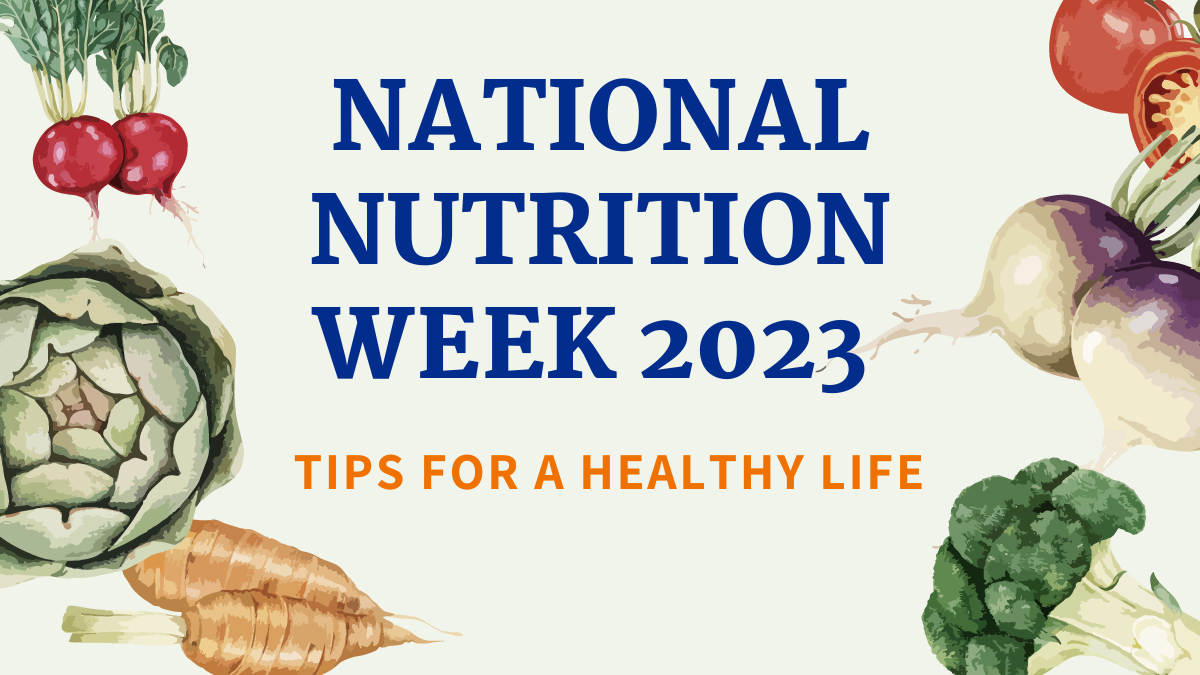Hello dear readers!
As we celebrate National Nutrition Week today onwards for the whole week, I extend my warmest wishes to each one of you for a healthy and illness-free life. In a world filled with countless distractions and demands, it’s crucial to take a moment to reflect on the importance of our health. Let’s embark on a journey together, a journey that begins with a simple yet intense resolution: to put our health first on the list of priorities.

Annually, between the 1st and 7th of September, we observe National Nutrition Week (NNW) with the aim of promoting public understanding of the significance of nutrition. Adequate nutrition serves as the bedrock that shapes an individual’s overall well-being by facilitating health maintenance and supporting normal growth and development.
In our modern rapid-paced way of living, to lead a healthy life and prevent diseases, it’s important to recognize and actively embrace the significance of good nutrition in our lives. A poor diet can elevate the risk of illness and health issues, whereas a well-balanced and diverse diet contributes to an improved quality of life.
Brief History
The National Nutrition Week (NNW), organized annually by the Food and Nutrition Board, a division under the Ministry of Women and Child Development in India, traces its origins back to the American Dietetic Association (ADA) in Cleveland,Ohio, now known as the Academy of Nutrition and Dietetics, which initiated it in 1975. The primary objective of this week is to promote public awareness regarding the manifold benefits associated with adopting a balanced diet and an active lifestyle.
The overwhelming reception of the idea of National Nutrition Week by the general population in 1980 prompted the extension of the celebrations from a mere week to an entire month. It was in 1982, when the Indian government launched a series of initiatives aimed at motivating, informing, and educating individuals about the significance of a nutritious diet in relation to longevity and well-being, that National Nutrition Week was first observed in India.
This week offers us a valuable opportunity to not only educate ourselves but also to enlighten those around us about the significance of nutrition and the benefits of maintaining a wholesome diet. It serves as a platform to share valuable tips and insights for enhancing our dietary choices. So, as you continue reading, we will provide you with a list of some of the most nourishing foods that you can incorporate into your daily meals.
Benefits of Good Nutrition
1. Boost Your Physical Health: Good nutrition ensures that your body receives the essential nutrients, vitamins, and minerals it needs to function at its best. It’s the key to maintaining a healthy weight and reducing the risk of chronic diseases like obesity, diabetes, heart disease, and certain cancers.
2. Energize Yourself: A well-balanced diet fuels your body, giving you the energy you need to tackle your daily tasks and challenges. When you eat right, you’ll find yourself more focused, alert, and productive in your everyday life.
3. Strengthen Your Immune System: Your immune system relies on proper nutrition to defend against infections and illnesses. Nutrient-rich foods like fruits and vegetables, packed with vitamins and minerals, play a vital role in bolstering your immune function.
4. Nurture Your Mental Health: What you eat can impact your mental well-being. Foods rich in omega-3 fatty acids and antioxidants can help reduce the risk of depression and anxiety while improving cognitive function. A balanced diet can also help you better manage stress.
5. Increase Your Lifespan: Healthy eating isn’t just about feeling good now; it’s an investment in your future. By reducing your risk of chronic diseases and promoting overall health, good nutrition can contribute to a longer, more fulfilling life.
6. Radiate Beauty: Your skin, hair, and nails benefit from proper nutrition. Nutrients support healthy skin, giving you that radiant glow, and they contribute to strong, shiny hair and nails.
7. Manage Your Weight: Maintaining a healthy weight is about more than just appearance. Good nutrition helps control your appetite, regulate your metabolism, and can aid in fat loss or muscle gain, as needed.
8. Prevent and Manage Diseases: Nutrition is a powerful tool for both preventing and managing health conditions. Whether you’re dealing with hypertension, diabetes, or other ailments, the right diet can make a substantial difference in your health outcomes.
9. Support Growth and Development: For our young ones, good nutrition is critical. It not only supports growth and development but also lays the foundation for lifelong healthy eating habits and overall well-being.
How to Eat Healthy and Have a Better Diet
Some valuable guidelines for promoting healthy eating and making informed dietary choices:
1. Understanding Calorie Needs: Achieving a healthy diet begins with a clear understanding of your daily calorie requirements. Consuming an appropriate number of calories ensures you maintain a balanced weight and avoid excessive fat accumulation. Striking this balance is key to overall well-being.
2. Embrace Starchy Carbohydrates: Incorporating starchy carbohydrates into your meals is vital. Aim for at least one-third of your food intake to consist of sources like potatoes, bread, rice, cereals, and whole grains. These foods provide sustained energy and essential nutrients.
3. Prioritize Fruits and Vegetables: Make an effort to include generous portions of fruits and vegetables in your diet, whether fresh, dried, juiced, or frozen. They are rich in vitamins, minerals, and dietary fiber, promoting good health and digestion.
4. Opt for Fish-Rich Diets: Consider including fish, especially oily fish like salmon and mackerel, in your meals. Fish is an excellent source of high-quality protein, along with essential vitamins and minerals. Regular fish consumption can contribute to a well-rounded diet.
5. Limit Saturated Fat and Sugar: Be mindful of your intake of saturated fat and sugar. Reducing these components can help lower cholesterol levels and reduce the risk of heart disease. Minimize the consumption of butter, cheese, cakes, biscuits, and other sugary and fatty foods.
6. Moderate Salt Intake: Limit your daily salt intake to no more than 6 grams per day. This practice can help prevent hypertension and its associated health risks. Being mindful of salt in your diet can be beneficial for long-term heart health.
7. Stay Hydrated: Proper hydration is essential for bodily functions and overall well-being. Ensure you consume an adequate amount of fluids throughout the day to prevent dehydration. Opt for water and fresh juices over alcoholic drinks and carbonated drinks which can have detrimental effects on your health.
8. Never Skip Breakfast: Dispel the misconception that skipping breakfast aids in weight loss. Quite the opposite, a healthy breakfast is the cornerstone of a balanced diet and sets the tone for a productive and energetic day.
Incorporating these principles into your daily eating habits can significantly contribute to a healthier, more vibrant life. Remember that a balanced diet is not only about what you exclude but also about the nutritious elements you include. By making informed choices and prioritizing your health, you are taking a proactive step towards a happier and healthier future.
2023 – Celebrating the International Year of Millets
Augment the health of people and environment by embracing millet- based diet.
Indian farmers embraced high-yielding varieties of wheat, cereal, and rice, supplemented by heavy chemical fertilizers, leading to abundant food production and well-stocked granaries, during the Green Revolution. While the Green Revolution successfully addressed hunger and malnutrition, it came at a cost: the rapid depletion of soil fertility and a decline in essential micronutrients, compromising the overall nutritional quality of our food.
The key to mitigating this issue lies in crop diversification. By cultivating and consuming a variety of crops, we can defeat the emergence of diseases associated with malnutrition. True nutritional diversity in our diets can only be achieved through dedicated efforts in crop diversification.
The Millet Renaissance: Millets, a group of small-seeded grains including sorghum, pearl millet, finger millet, and foxtail millet, have long been cultivated across diverse regions of the world. They have historically played a significant role in the diets of many communities, providing sustenance and nutrition in challenging environments. Millets are known for their resilience in the face of adverse climate conditions, making them a valuable asset in the context of climate change.
Considering the ever-expanding global population and the promising role of millets as a nutritious and affordable food option, India’s proposal was met with approval by the Food and Agriculture Organization of the United Nations. Consequently, 2023 has been declared the International Year of Millets, recognizing the pivotal role these ancient grains can play in addressing contemporary global food and nutrition challenges.
The International Year of Millets 2023 aims to prompt a global movement around these nutritious grains. It seeks to raise awareness of their nutritional benefits, promote research and innovation in millet cultivation and processing, and encourage governments, farmers, and consumers to include millets in their agricultural practices and diets.
Some of the common and easily available millets that can be added to our daily diet are:
Pearl Millet: Abundant in dietary fiber and essential amino acids.
Foxtail Millet: Shows promise in improving glycemic control for individuals with type 2 diabetes.
Kodo Millet: Distinguished by its elevated polyphenol content, it holds potential for addressing obesity.
Barnyard Millet: Contains higher quantities of proteins, fibers, and most micronutrients when compared to other major cereal grains.
Finger Millet: Notable for its rich polyphenol content, it has potential applications in managing obesity.
Little Millet: A bountiful source of sulphur-containing amino acids.
Sorghum Millet: Boasts high levels of riboflavin, thiamine, niacin, and folic acid vitamins.
Some Nutrient-rich foods for a Balanced diet plan
As per the National Institute for Nutrition, Hyderabad the recommended list of nutrient- rich foods for a complete and balanced diet for Indian population is as follows:
1. Energy – Cereals and Tubers, Nuts and Oil seeds, Vegetable oils, ghee
2. Protein – Pulses and Legumes, Fish, Meat and Poultry, Nuts and Oils seeds, Milk products
3. Beta-carotene – Leafy vegetables, Other vegetables and Fruits
4. Folic acid – Green leafy vegetables, Pulses and oil seeds
5. Iron – Green leafy vegetables
6. Calcium – Cereals and legumes, Green leafy vegetables, Milk and milk products, Nuts and Oil seeds and Fish
7. Vitamin C – Green leafy vegetables, Fruits and other vegetables
8. Fibre – Cereals and Pulses
9. Vitamin A – Fats and edible oils
10. Riboflavin – Cereals and grains, Nuts and Oil seeds, Pulses and Leafy vegetables, Condiments and spices, Fruits, Meat and Poultry, Milk and milk products.
Conclusion
As I conclude, let me quote Thomas Edison “The doctor of the future will no longer treat the human frame with drugs, but rather will cure and prevent disease with nutrition.” I hope this will bring to your perspective that, good nutrition is not just a matter of personal choice; it’s a fundamental pillar of our overall health and well-being. It affects every aspect of our well-being, from our physical health and energy levels to our mental and emotional stability. By making informed choices about what we eat, we can significantly enhance our quality of life and reduce the risk of many chronic diseases and mental stress, ultimately enabling us to lead longer and happier lives. Stay Healthy – Live Happy!!
Also Read
Important Facts about RBI: History, Role & Responsibilities and Functions
Computer Awareness: Tips and Strategies for Success in Competitive Exams
How to Prepare for IBPS SO Exam?
What is Preposition, its Use and Examples














